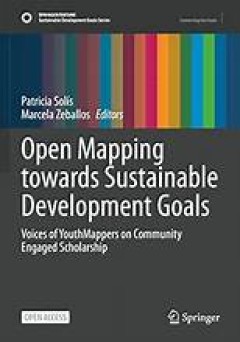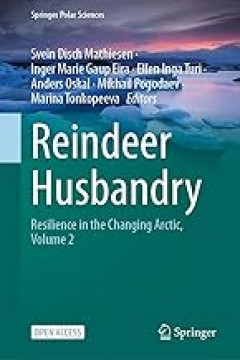Filter by

Towards the ethics of a green future: the theory and practice of human rights…
- Edition
- -
- ISBN/ISSN
- 9781315115788
- Collation
- -
- Series Title
- -
- Call Number
- -
- Edition
- -
- ISBN/ISSN
- 9781315115788
- Collation
- -
- Series Title
- -
- Call Number
- -

The African Marine Litter Outlook
This open access book provides a cross-sectoral, multi-scale assessment of marine litter in Africa with a focus on plastics. From distribution, to impacts on environmental and human health, this book looks at what is known scientifically. It includes a policy analysis of the instruments that currently exist, and what is needed to help Africa tackle marine litter—including local and transbound…
- Edition
- 1
- ISBN/ISSN
- -
- Collation
- -
- Series Title
- -
- Call Number
- XXII, 224

Managing sustainable luxury and digitalization :technology trends and ethical…
Defining luxury in the watch industry: exploring the gestalt of Swiss luxury watches -- Trends and challenges in the Swiss luxury watch industry: insights from an expert survey -- Luxury watches and ethical hubris: a comparative overview of illustrative cases -- Gestalt-switch of luxury products: exploring pitfalls of inconsistent value expressions in conspicuous consumption -- "Some of my cust…
- Edition
- -
- ISBN/ISSN
- 9781003397205
- Collation
- -
- Series Title
- -
- Call Number
- -

The Living Environmental Education
This open access book is designed and written to bridge the gap on the critical issues identified in environmental education programs in Asian countries. The world and its environments are changing rapidly, and the public may have difficulty keeping up and understanding how these changes will affect our way of life. The authors discuss various topics and case studies from an Asian perspective,…
- Edition
- 1
- ISBN/ISSN
- 978-981-19-4234-1
- Collation
- -
- Series Title
- Sustainable Development Goals Series
- Call Number
- XXV, 279

Rethinking Infrastructure Design for Multi-Use Water Services
As we approach a historic tipping point in the global trend toward urbanisation – within two decades urban dwellers will increase from 49% to 60% of the planet’s population – this book identifies and addresses a critical problem: water. The editors show how cities can shift from being water consumers to resource managers, applying urban water management principles to ensure access to wate…
- Edition
- -
- ISBN/ISSN
- 978-3-319-06275-4
- Collation
- -
- Series Title
- -
- Call Number
- -

Open Mapping towards Sustainable Development Goals
This collection amplifies the experiences of some of the world’s young people who are working to address SDGs using geospatial technologies and multi-national collaboration. Authors from every region of the world who have emerged as leaders in the YouthMappers movement share their perspectives and knowledge in an accessible and peer-friendly format. YouthMappers are university students who cr…
- Edition
- 1
- ISBN/ISSN
- 978-3-031-05182-1
- Collation
- -
- Series Title
- Sustainable Development Goals Series
- Call Number
- XXIII, 382

Sustainable Qatar
This open access book provides a topical overview of the key sustainability issues in Qatar, focusing on environmental sustainability from a socio-political perspective. The transition to a sustainable Qatar requires engagement with diverse areas of social-political, human, and environmental development. On the environmental aspects, the contributors address climate change, food security, water…
- Edition
- 1
- ISBN/ISSN
- 978-981-19-7398-7
- Collation
- -
- Series Title
- Gulf Studies
- Call Number
- XIII, 380

50 Years World Heritage Convention: Shared Responsibility – Conflict & Reco…
This open access book identifies various forms of heritage destruction and analyses their causes. It proposes strategies for avoiding and solving conflicts, based on integrating heritage into the 2030 Agenda for Sustainable Development. It reflects on the identity-building role of heritage, on multidimensional conflicts and the destruction of heritage, and considers conflict-solving strategies …
- Edition
- 1
- ISBN/ISSN
- 978-3-031-05660-4
- Collation
- -
- Series Title
- Heritage Studies
- Call Number
- XL, 504

SDGs, Transformation, and Quality Growth
This is an Open Access book. The primary objective of this book is to seek out insights into the concept of high-quality growth (HQG). It explores the essential attributes of HQG, such as inclusiveness, sustainability, and resilience, as well as its relationship with transformation, by drawing principally on illustrative cases and instances of international cooperation. The United Nations docum…
- Edition
- -
- ISBN/ISSN
- 978-981-16-9748-7
- Collation
- -
- Series Title
- -
- Call Number
- -

Reindeer Husbandry
This open access book focuses on climate change, indigenous reindeer husbandry and the underlying concept of connecting the traditional knowledge of indigenous reindeer herders in the Arctic with the latest research findings of the world’s leading academics. The Arctic and sub-Arctic environment, climate and biodiversity are changing in ways unprecedented in the long histories of the nor…
- Edition
- -
- ISBN/ISSN
- 978-3-031-42289-8
- Collation
- XXXVI, 217
- Series Title
- -
- Call Number
- -
 Computer Science, Information & General Works
Computer Science, Information & General Works  Philosophy & Psychology
Philosophy & Psychology  Religion
Religion  Social Sciences
Social Sciences  Language
Language  Pure Science
Pure Science  Applied Sciences
Applied Sciences  Art & Recreation
Art & Recreation  Literature
Literature  History & Geography
History & Geography